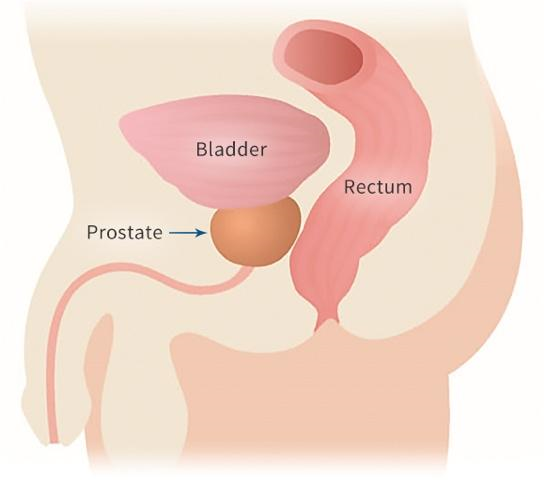What is the Prostate?

The prostate is a small, walnut-sized gland located in the male pelvic region. It is near to the rectum (bowel), testes, and penis. It also encases the outlet pipe of the bladder.
The function of the prostate is to produce some of the fluid that makes up the semen. This prostatic fluid, milky or white in appearance, is released into the semen, along with spermatozoa and seminal vesicle fluid.
The prostate gland, like all the other male glands, is controlled by the male hormones, mainly testosterone. In the case of the prostate it is dihydrotestosterone (DHT), a product of testosterone, that predominantly provides regulation. The growth and/or multiplication of the prostate cells is controlled by this hormone.
What is the PSA?

The prostate-specific antigen (PSA) is a protein produced by the prostate gland and is released into the semen, and in small amounts into the bloodstream.
In order to understand the significance of the PSA, it is very useful to compare the prostate gland to a large tree.
As a tree grows it usually makes more leaves. If the leaves represent the PSA, then an increase in leaves suggests that the tree has grown larger. We will come back to that in a moment.
Why is my PSA Level Important?
Recall our earlier example about the prostate gland being the tree, and the PSA the leaves. The PSA blood tests basically measures the number of leaves on the ground around the tree. The larger the tree, the more leaves we expect to fall to the ground. You can now understand why your doctor frequently measures your PSA reading.

In very general terms, the normal range is 0-4 units/leaves. However, as the tree grows, it produces more and more leaves. In very advanced prostate cancer, the PSA can easily exceed 100 units/leaves!
However, be very careful about interpreting PSA readings on your own, because there are other possible reasons for an increase. Always get advice from your doctor before becoming alarmed.
What is Prostate Cancer?
Cancer causes an organ to behave outside of its normal function, or outside of the control of the overall body’s systems. This abnormal behavior usually causes damage to the body. In the case of the prostate gland, prostate cancer results in abnormal, destructive multiplication of prostate cells.
This can lead to growth of the cancerous area, as well as invasion of the surrounding areas we mentioned above: bladder, rectum, etc. Generally, prostate cancer is very slow-growing, taking months to years to progress.
However, the cancer can also spread to distant areas, usually to the bones of the spine. This is what can make this particular type of cancer dangerous.
How Did I Develop This Illness?
It is not clear what causes prostate cancer.2 The clearest risk factors are obesity, age and family history. Prostate cancer is very rare in men younger than 45, but common in older men. The average age at the time of discovery is 70.3
It is important to note that many men never realize they have prostate cancer. In fact, autopsy studies of over 1,000 men of different nationalities have found prostate cancer in 30% of men in their fifties, and in 80% of men in their seventies. 4 These men had all died from unrelated causes, and were only discovered to have prostate cancer when the autopsies were done.
What Happens Next?
The current opinion in the medical field is that prostate cancer cells generally remain dependent on male hormones for growth and survival. In addition, you will recall that prostate cancer usually grows very slowly. So, if it is discovered early, there is usually more than enough time to decide what you want to do.
Treatment options will vary depending on the level of aggressiveness of the cancer cells, and also based on whether or not they have invaded other structures.
Some men with early-stage prostate cancers can now be observed for long periods without treatment, in what is called a “watchful waiting” approach.5 The thinking is that these men can start treatment later, once there is any suggestion that the cancer is growing. Your doctor will tell you if this approach is right for you.
In most cases, active treatment will involve medications that starve the cancer cells of the male hormones they need to survive. This is an indirect approach, but is generally very effective at slowing the growth of the cancer. Most men live for several years using this approach.
Your doctor may also recommend direct destruction of the cancerous prostate tissue. This can be achieved by removing the tissue via surgery, or sometimes by radiating the cancerous area using external beam radiation.
The concern of course, is about the nearby bladder, rectum, blood vessels and nerves. Your doctor will discuss with you whether the surgery or radiation has the risk of damaging these structures.6
If the cancer has already spread to the spine, your doctor may wish to be a little more aggressive with treatment. He/she may recommend surgery or radiation to the bones of the spine, to reduce any damage to these important bones. In some cases, you may even be offered chemotherapy, if earlier treatment options have not been successful.
What Can I Do Today?
A brilliant scientist by the name of Dr. Max Gerson once proposed the theory of totality. He suggested that all degenerative diseases are due to either an excess of toxins, deficiency of nutrients, or both!
Indeed, a growing body of evidence supports the relationship between exposure to environmental toxins and subsequent development of cancer (and other diseases).
It would be strongly advised that anyone diagnosed with cancer immediately adjust their dietary and lifestyle habits. This provides the best chance of healing. Dr. Gerson’s world-famous approach, the Gerson Therapy, is an excellent way to start. If necessary, it may even be used alongside the other treatments recommended by your doctor.
Start now with these 4 simple steps:
- Go through your kitchen and rid it of any processed foods and salty snacks, and fill it with fresh, organic fruits and vegetables.
- Learn how to preserve nutrients by using the Gerson slow-cooking method, and start trying simple recipes. The Gerson Therapy Cookbook is a great resource.
- Regardless of what kind of juicer you have right now, it’s a good time to start daily juicing habits. Keep it simple with carrot and/or carrot-apple juice and stay hydrated with distilled water or herbal teas.
- Visit the Gerson Institute’s Get Started page and start the evaluation process for either a Licensed Gerson Clinic or Web-Based Case Management.
About the Author:

Dr. Andre Williams, M.B., B.S., DM, GPC is a certified, award-winning haematologist/oncologist trained at the University of the West Indies. Operating his practice, Teshuva Wellness Centre, in the beautiful city of Montego Bay, Dr. Williams is very passionate about integrating nutritional and complementary strategies alongside conventional cancer care. Dr. Williams is a Certified Gerson Practitioner providing Web-Based Case Management for the Gerson Therapy: Apply HERE.
References
- https://www.cancer.gov/types/prostate
- Hsing AW, chokkalingam AP (2006). “Prostate cancer epidemiology”. Frontiers in Bioscience. 11:1388-413. PMID 1636854. doi: 10.2741/1891.
- Hankey BF, Feuer EJ, Clegg LX, Hayes RB, Legler JM, Prorok PC, Ries LA, Merrill RM, Kaplan RS (June 16, 1999). “Cancer surveillance series: interpreting trends in prostate cancer-part I: Evidence of the effects of screening in recent prostate cancer incidence, mortality, and survival rates”. J Natl Cancer Inst. 91 (12): 1017-24. PMID 10379964. doi: 10.1093/jnci/91.12.1017.
- Breslow N, Chan CW, Dhom G, Drury RA, Franks LM, Gellei B, Lee YS, Lundberg S, Sparke B, Sternby NH, Tulinius H (November 15, 1977). “Latent carcinoma of prostate at autopsy in seven areas. The International Agency for Research on Cancer, Lyons, France”. Int J Cancer. 20 (5): 680-8. PMID 924691. doi: 10.1002/jic.2910200506.
- “Active Surveillance May Be Preferred Option in Some Men with Prostate Cancer”. Cancer.gov. 2011-04-19. Archived from the original on 2011-05-03. Retrieved 2011-08-29.
- Zincke H, Bergstralh EJ, Blute ML, et al.: Radical prostatectomy for clinically localized prostate cancer: long-term results of 1,143 patients from a single institution. J Clin Oncol 12 (11): 2254-63, 1994.
Educational articles like this are made possible with the help of your donations. Help us continue the legacy of Dr. Max Gerson, his daughter Charlotte Gerson, and the thousands who rely on the Gerson Institute for vital educational materials and training.





